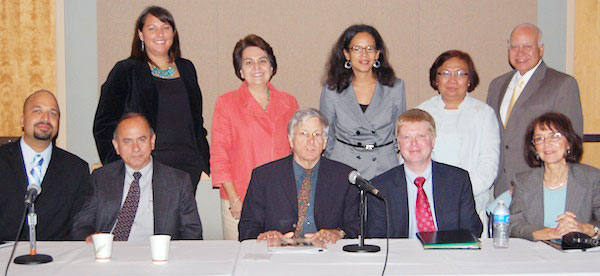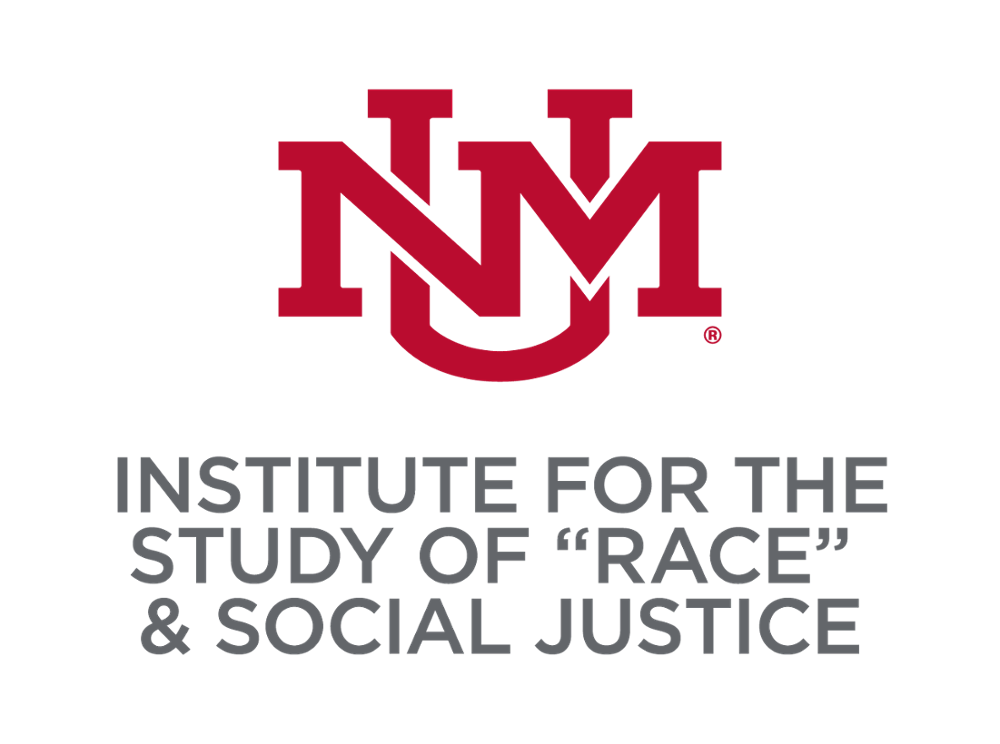About Us
 |
|
Vision Statement: Inquiry and praxis for advancing racial and intersectional justice
Established in January 2009, our mission is:
- To promote the establishment of empirical, theoretical and methodological clarity about "race" that draws on cutting-edge thinking from multiple disciplines and diverse empirical traditions
- Promote clarity about race, racialization that builds on the insights of multiple disciplines
- Develop strategies for ameliorating race-based inequality
We place "race" in quotes to underscore its nature as a socially constructed category of social status in particular historical contexts, rather than as a reified category that is essential or fixed.
Despite the fact that "race" is neither rooted in biology (or genetics) or fixed in time and space, racial inequality persists and often remains at the root of socioeconomic inequality, health disparities and other measurements of social stratification in the United States.
Racism is a major factor in determining one's health in our society, as it translates into persistent stress, associated illness and prolonged suffering or premature death.
Over the centuries, American Indians, African Americans and Latinos have suffered from severe racism in various forms, and they experience the poorest health status as a result.
Objectives of the Institute
- Provide best practices expertise (i.e., empirical, theoretical, methodological) and consulting to researchers in the natural and social sciences seeking to incorporate racial variables and racialization processes and dynamics into their studies.
- Provide expertise and consulting community members and policy-makers at the tribal, state, county and municipal levels for measuring (assessing) and ameliorating (addressing) racial disparities; create successful research partnerships between the university and surrounding local and national communities.
- Foster an institutional context for ongoing scholarly conversations about the empirical, theoretical and methodological understanding and empirical study of "race."
- Nurture research agendas of UNM faculty as they relate to mapping and interrupting racial disparities and promoting equity and social justice in health and community viability, education, law and criminal justice.
Nancy López PhD
STREET RACE EXPLAINED FOR IDENTIFYING AND ELIMINATION INEQUALITY
What’s your street race? If you were walking down the street what race to you think strangers would assume you are based on what you look like? The beauty of this question is that it challenges the myth or race as biology, genetic ancestry or culture and instead focuses on race as social relationship of power that is not just about your personal identity. Our research shows that when you use the street race measure in studies about inequality you can make visible inequities that would otherwise remain hidden if we only ask about how you identify (López 2014; López et al., 2018; Vargas et al., 2019).
It’s always important to include at least two questions when asking about race: 1.) How do you identify; and 2.) How do you think others see your race? Equally important is making sure that you mark one box when asked about your street race. Think about why President Obama marked one box in the 2010 Census and the Civil Rights use of that data to detect housing, health care access and employment discrimination. If President Obama were walking down the street looking for an apartment or if he showed up in an emergency room with symptoms of appendicitis would anyone think he’s white?
Another challenge is the ways in which race and ethnicity are confused. In 2018 I wrote an essay entitled “The Census Bureau Keeps confusing race and ethnicity. There I talk about street race as the social meanings assigned to the conglomeration of your skin color, hair texture, facial features and how those of us interested in understanding everyday racism should not just ask about ethnicity or cultural background. We also need to ask about street race. For example, if we ask about some’s race or ethnic origin in one question and the person says, Cuban, Puerto Rican or Mexican, and stop there, we may miss an opportunity to find out if Puerto Ricans who are light-skinned and probably not seen as Black or Brown are treated differently from those who are their siblings but may be seen as Black or Brown when walking down the street. Only when we critically assess our own street race can we begin the journey of shifting to understand the experiences of others who may be members of the same family but assigned different street races in their everyday interactions. Hopefully through everyday critical reflection about street race, we create bridges of understanding, empathy, unity and solidarity. I hope that the street race measure becomes a gold standard for all data collection that helps us map injustice and create a more just world anchored in human rights, not only for ourselves but also for our children, families and communities for generations to come.
STREET RACE PUBLICATIONS
Vargas, E. D., Juarez, M., Stone, L. C., & Lopez, N. (2019). Critical ‘street race’ praxis: advancing the measurement of racial discrimination among diverse Latinx communities in the US. Critical Public Health, 1-11.
López, Nancy, Edward Vargas, Melina Juarez, Lisa Cacari-Stone and Sonia Bettez. 2017. “What’s Your “Street Race”? Leveraging Multidimensional Measures of Race and Intersectionality for Examining Physical and Mental Health Status among Latinxs.” Sociology of Race and Ethnicity. doi:10.1177/2332649217708798.
Innovative Multidimensional Measure of Race/Racialization as Analytically Distinct from Ethnicity or National Origin: “Street race” has been measured empirically in the following surveys: 2015 Latino National Health and Immigration Survey (N=1,473) RWJF Center for Health Policy; 2016 Collaborative Multiracial Post-Election Survey (N=10,145); 2016 The New Landscapes of a Majority-Minority State: Politics, Economy, Health, and Well-Being in New Mexico (NLMMS) RWJF Center for Health Policy (N= 1,505); 2017-2018 Visibilizing AfroLatin@s: Measuring Race Among Latin@s, AfroLatino Forum Survey, New York (in progress). See also, Reyna, Chandra. 2018. “’Street Race’ and Health,” In Brief, Contexts 17(2): 4-7. http://journals.sagepub.com/doi/10.1177/1536504218785907
López, Nancy. 2018. The US Census Bureau keeps confusing race and ethnicity, The Conversation, February 28, https://theconversation.com/the-us-census-bureau-keeps-confusing-race-and-ethnicity-89649
Republished in Salon, Associated Press, Newsela for teachers in K-12 Instructional Online Platform (Over 64K readers)
López, Nancy. 2017. Why the 2020 Census Should Keep Longstanding Separate Questions About Hispanic Origin and Race. Scholars Strategy Network. Last access 9/27/17: http://www.scholarsstrategynetwork.org/brief/why-2020-census-should-keep-longstanding-separate-questions-about-hispanic-origin-and-race
López, Nancy. 2014. “What’s Your “Street Race-Gender”? Why We Need Separate Questions on Hispanic Origin and Race for the 2020 Census. RWJF Human Capital Blog. November 26, RWJF Blog, http://www.rwjf.org/en/blogs/culture-of-health/2014/11/what_s_your_street.html
Street Race and Street Gender Questions used in 2016 The New Landscapes of a Majority-Minority State: Politics, Economy, Health, and Well-Being in New Mexico (NLMMS) RWJF Center for Health Policy (N= 1,505).
López, Nancy. 2013. “An Inconvenient Truth: ‘Hispanic’ is an Ethnic Origin, not a ‘Race.’” Guest Commentary, August 24. National Institute for Latino Policy (NiLP). Last accessed 2/1/7 at: http://www.unm.edu/~socdept/pdfs/NiLP.pdf .
López, Nancy, Christopher Erwin, Melissa Binder and Mario Chavez. 2017. “Making the Invisible Visible: Advancing Quantitative Methods Through Critical Race Theory and Intersectionality for Revealing Complex Race-Gender-Class Inequalities in Higher Education, 1980- 2015.” Special Issue: QuantCrit: Critical Race Theory and Quantitative Research Methods, Race, Ethnicity and Education, http://dx.doi.org/10.1080/13613324.2017.1375185 .
Director Bio
Shinsuke Eguchi (Ph.D., Howard University) is a Full Professor of Intercultural Communication in the Department of Communication and Journalism at the University of New Mexico. They are also a Director of the Institute for the Study of Race and Social Justice and an Affiliate in multiple departments and programs (i.e., Africana Studies, American Studies, Feminist Research Institute, and Women, Gender, & Sexuality Studies) on this campus.
Professor Eguchi’s research interests focus on global and transcultural studies, queer of color critique, intersectionality and racialized gender politics, Asian/American studies, and performance studies. More specifically, they deploy queer of color critique to examine the interlocking systems of power and domination rooted in socially constructed categories of differences, such as race, ethnicity, gender, sexuality, class, nation, coloniality, language, and the body. They privilege an intersectional queer analytic that centralizes historically saturated and cultural nuances of knowledge(s) emerged from lived experiences of minoritized sexual and gender people of color. It interrogates the complexities and contradictions of power, social institutions, interactions, and processes. Their mobilization of queer of color critique elaborates the issues and concerns of globalization, transnationalism, postcolonialism, migration, or diaspora grounded in social activism and advocacy.
Professor Eguchi is Author of Asians loving Asians: Sticky Rice Homoeroticism and Queer Politics (Peter Lang, 2022). Their solo-authored and co-authored works have appeared for publication in larger numbers of journal outlets, including but not limited to, Communication Theory, Communication, Culture, and Critique, Critical Studies in Media Communication, Quarterly Journal of Speech, Journal of International and Intercultural Communication, Text and Performance Quarterly, Communication and Critical/Cultural Studies, Review of Communication, Western Journal of Communication, Women’s Studies in Communication, and Journal of Homosexuality. Their solo-authored and co-authored works can be also found in various edited books such as Handbook of Critical Intercultural Communication, Handbook of Media and Social Justice, Routledge Handbook of Queer Rhetoric, and Interrogating Communicative Power of Whiteness. Moreover, Professor Eguchi is co-editor of Intercultural Communication in Japan (2017, Routledge), coeditor of Queer Intercultural Communication (2020, Rowman & Littlefield), coeditor of De-Whitening Intersectionality (2020, Lexington Press), coeditor of Transnationalizing Critical Intercultural Communication (2024, Peter Lang), and coeditor of Routledge Handbook of Ethnicity and Race in Communication (2024, Routledge).

